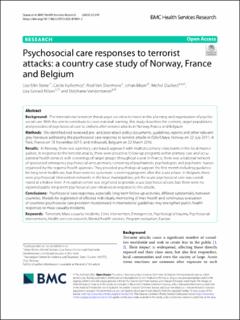| dc.contributor.author | Stene, Lise Eilin | |
| dc.contributor.author | Vuillermoz, Cécile | |
| dc.contributor.author | Overmeire, Roel Van | |
| dc.contributor.author | Bilsen, Johan | |
| dc.contributor.author | Dückers, Michel | |
| dc.contributor.author | Nilsen, Lisa Govasli | |
| dc.contributor.author | Vandentorren, Stéphanie | |
| dc.date.accessioned | 2023-02-28T09:05:57Z | |
| dc.date.available | 2023-02-28T09:05:57Z | |
| dc.date.created | 2022-04-09T15:19:49Z | |
| dc.date.issued | 2022 | |
| dc.identifier.citation | BMC Health Services Research. 2022, 22 . | en_US |
| dc.identifier.issn | 1472-6963 | |
| dc.identifier.uri | https://hdl.handle.net/11250/3054539 | |
| dc.description.abstract | Background
The international terrorism threat urges societies to invest in the planning and organization of psychosocial care. With the aim to contribute to cross-national learning, this study describes the content, target populations and providers of psychosocial care to civilians after terrorist attacks in Norway, France and Belgium.
Methods
We identified and reviewed pre- and post-attack policy documents, guidelines, reports and other relevant grey literature addressing the psychosocial care response to terrorist attacks in Oslo/Utøya, Norway on 22 July 2011; in Paris, France on 13 November 2015; and in Brussels, Belgium on 22 March 2016.
Results
In Norway, there was a primary care based approach with multidisciplinary crisis teams in the local municipalities. In response to the terrorist attacks, there were proactive follow-up programs within primary care and occupational health services with screenings of target groups throughout a year. In France, there was a national network of specialized emergency psychosocial units primarily consisting of psychiatrists, psychologists and psychiatric nurses organized by the regional health agencies. They provided psychological support the first month including guidance for long-term healthcare, but there were no systematic screening programs after the acute phase. In Belgium, there were psychosocial intervention networks in the local municipalities, yet the acute psychosocial care was coordinated at a federal level. A reception centre was organized to provide acute psychosocial care, but there were no reported public long-term psychosocial care initiatives in response to the attacks.
Conclusions
Psychosocial care responses, especially long-term follow-up activities, differed substantially between countries. Models for registration of affected individuals, monitoring of their health and continuous evaluation of countries’ psychosocial care provision incorporated in international guidelines may strengthen public health responses to mass-casualty incidents. | en_US |
| dc.language.iso | eng | en_US |
| dc.publisher | BMC | en_US |
| dc.rights | Navngivelse 4.0 Internasjonal | * |
| dc.rights.uri | http://creativecommons.org/licenses/by/4.0/deed.no | * |
| dc.title | Psychosocial care responses to terrorist attacks: a country case study of Norway, France and Belgium | en_US |
| dc.title.alternative | Psychosocial care responses to terrorist attacks: a country case study of Norway, France and Belgium | en_US |
| dc.type | Peer reviewed | en_US |
| dc.type | Journal article | en_US |
| dc.description.version | publishedVersion | en_US |
| dc.source.pagenumber | 21 | en_US |
| dc.source.volume | 22 | en_US |
| dc.source.journal | BMC Health Services Research | en_US |
| dc.identifier.doi | 10.1186/s12913-022-07691-2 | |
| dc.identifier.cristin | 2016374 | |
| dc.relation.project | Norges forskningsråd: 288321 | en_US |
| cristin.ispublished | true | |
| cristin.fulltext | original | |
| cristin.qualitycode | 2 | |

